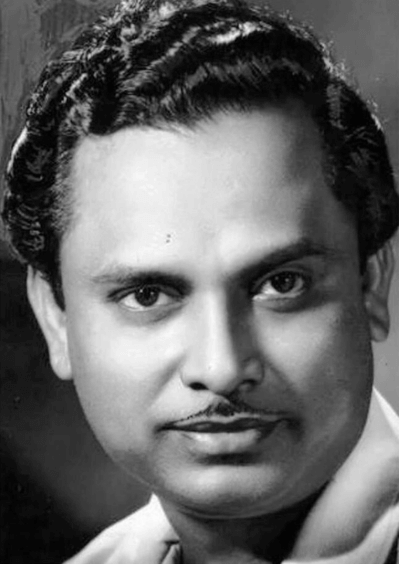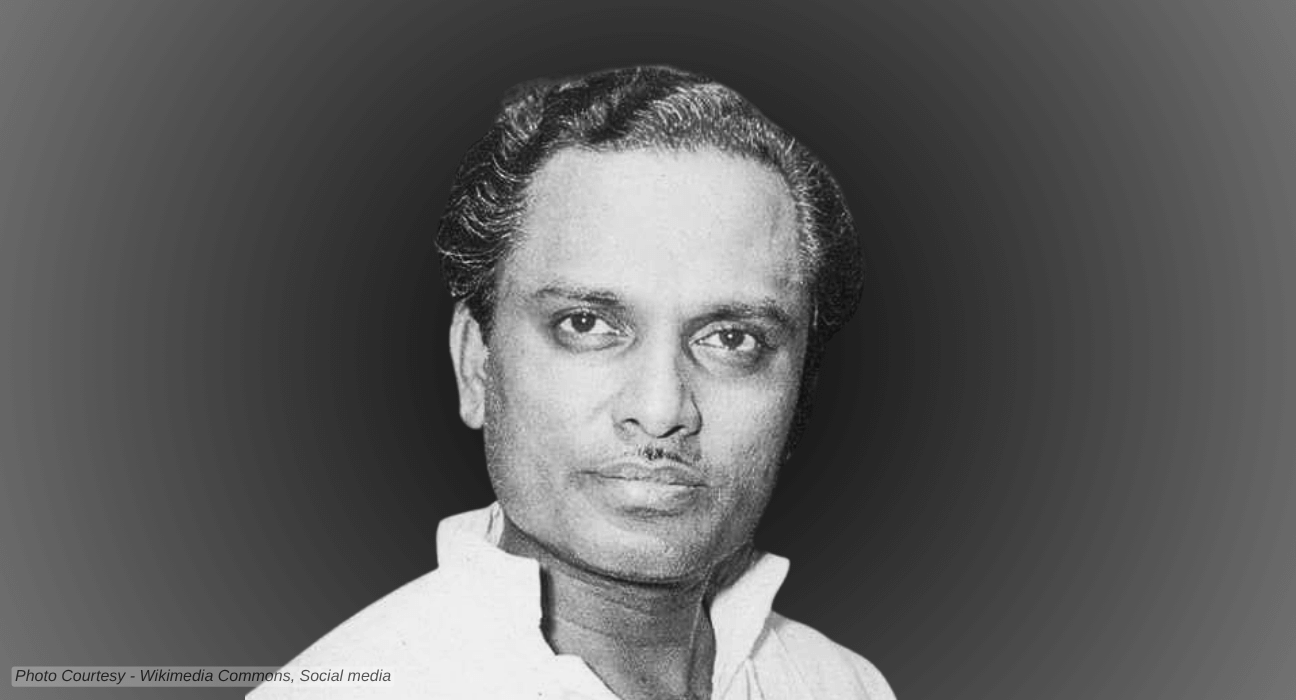Anil Biswas was the musical genius who, despite his introduction of twelve pieces of orchestral music and full-blooded choral effects, remained loyal to Indian classical or folk elements. Some of his best-known songs include “Aaj Himalay Ki Choti Se,” “Dhire Dhire Aa Re Badal,” “Aye Dil Mujhe Aisi Jagah Ley Chal,” “Yaad Rakhna Chand Taaron,” “Dil Jalta Hai to Jalne De,” “Seene Mein Sulagte Hai Armaan,” “Jali Jo Shakh Chaman,” and many more.
Early Life
Anil Biswas, born Anil Krishna Biswas on July 7, 1914, in Barisal, which is now in Bangladesh, was a towering figure in the world of Indian film music. His father’s name was J. C. Biswas. The Viswas household was the local cultural and artistic center, which led young Anil to act in local theater as a child actor. He was also inspired by his mother, who used to sing devotional songs.

By the age of 14, he was proficient in playing the tabla and had begun composing music for local concerts. However, his artistic pursuits were intertwined with the fervor of the Indian independence movement. His involvement in revolutionary activities led to repeated imprisonments and eventually forced him to flee to Calcutta in disguise after his father’s death in 1930.
In Calcutta, Biswas’ musical talents flourished as he composed music for plays and worked with the “Rangmahal Theatre.” He also worked with the “Hindustan Recording Company” as a singer, lyricist, and composer. His move to Bombay in 1934 marked the beginning of an illustrious career in the film industry.
In Bombay, Anil Da joined Ram Daryani’s Eastern Art Syndicate. He contributed to the music for “Baal Hatya” and “Bharat ki Beti” before debuting as a film composer with Dharam ki Devi (1935), where he composed the background music, acted, and sang the song “Kuch Bhi Nahin Bharosa.”
Breakthrough Of Anil Biswas
In 1936, he joined “Sagar Movietones” and worked as an assistant composer to Ashok Ghosh and Pransukh Nayak. In this period, he made a few small films like Piya Ki Jogan, Pratima, Prem Bandhan, Sangdil Samaj, Sher Ka Panja, Shokh Dilruba (1936), Bulldog (1936), Dukhiari (1936), and Gentleman Daku (1937). He was the assistant of Ashok Ghosh when he gave music to Mehboob Khan’s Manmohan (1936). Mehboob Khan gave him his big break with “Jagirdar (1937),” which established him as a music director of repute. He went on to do many films with Mehboob Khan, such as Watan (1938), Hum Tum Aur Woh (1938), Ek Hi Raasta (1939), Alibaba (1940), Aurat (1940), and Bahen (1941).
He also gave music to films like Kokila (1937), 300 Days and After (1937), Gramophone Singer (1938), Hum Tum Aur Woh (1937), Pooja (1940), Aasra (1941), Vijay (1942), and Jawani (1942).
Anil Biswas is credited with pioneering playback singing and introducing orchestral music and choral effects into Indian cinema. His work is characterised by a blend of Indian classical and folk elements with Western symphonic music, creating a unique sound that was ahead of its time. He
The 1942 film “Roti,” directed by Mehboob Khan, featured a groundbreaking technique of counter-melody, where one musical line overlaps another in contra-melody, a method derived from Western music. This technique, along with the use of recitative prose songs, marked a significant departure from the prevailing norms of film music composition at the time.
The Star Composer
His next big film was “Kismet,” where he introduced the “full chorus” for the first time in Hindi cinema. The film was notable for its catchy tunes like “Ghar Ghar Mein Diwali” and a soothing lullaby, “Dheere Dheere Aa,” and the patriotic song “Door Hato Ae Duniyawalon,” which became an anthem of sorts during the Indian independence movement.

Photo courtesy – Social Media

In the following years, he composed music for films like Jwar Bhata (1944), which was Dilip Kumar’s debut, and Milan (1946), also starring Dilip Kumar, before leaving Bombay Talkies.
Anil Da was instrumental in giving break to Mukesh in Pehli Nazar (1945), where he sang the classic “Dil Jalta Hai to Jalne De,” and Talat Mahmood in Arzoo (1949), with the song “Aye Dil Mujhe Aisi Jagah Ley Chal.”
Anil Da also produced a few films under the banner “Variety Pictures” with his wife, Ashalata Biswas. He composed music for four films: “Laadli” (1949), “Laajawaab” (1950), “Badi Bahu” (1951), and “Humdard” (1953).
Among his most memorable compositions are the songs from the films “Anokha Pyar” (1948), “Tarana” (1951), “Rahi” (1952), “Waaris” (1954), the songless film “Munna” (1954), “Pardesi” (1957), and “Char Dil Char Rahen” (1959). These films not only showcased his versatility as a composer but also his innovative approach to music-making in Indian cinema.
Later Works
In 1962, he worked on Mahesh Kaul’s Sautela Bhai (1962) and legendary actor Motilal‘s directorial venture Chhoti Chhoti Baatein (1965), which has Mukesh’s classic “Zindagi Khwab Hai Tha Hamein Bhi.” Unfortunately, Motilal passed away before the film’s release, and it flopped at the box office, though it did win a National Film Award.
Anil Da chose to retire from films in the early 1960s and moved to New Delhi, where he became director of the National Orchestra at the All India Radio (AIR). He remained Chief Producer of Sugam Sangeet (light Hindustani classical music) at AIR, Delhi, till 1975. Years later, he composed the music for Doordarshan’s iconic TV series Hum Log (1984).
Personal Life
Anil Biswas married actress Ashalata in the mid-1930s. The couple went on to have three sons: Pradeep, Amit, and Utpal, and a daughter, Shikha (now Shikha Vohra). Their son Utpal Viswas is one half of the famous musician duo “Amar-Utpal,” who gave music in films like “Shahenshah,” “Main Azaad Hoon,” “Kasam Teri Kasam,” and “Aaja Meri Jaan.” Anil Da and Ashalata Ji separated in 1954, but she remained the legal wife. He later married playback singer Meena Kapoor, the daughter of actor Bikram Kapoor.
Anil Biswas was not only a great musician, but he was also responsible for training greats like C. Ramachandra, Roshan, Mohammed Shafi, and Madan Mohan. His inflection was such that people like Naushad Saab and O.P. Nayyar openly admitted that they grew up admiring Anil Da’s tunes. Lata Ji once said that Anil Da taught her breathing control techniques. Apart from Lata, Muklesh, and Talat Mehmood, he also mentored singers such as Surendranath, Parul Ghosh, Amirbai Karnataki, and Roshan Ara Begum.
Anil Biswas passed away on May 31, 2003, but his legacy lives on in the melodies that continue to resonate with generations of music lovers. His life’s work stands as a bridge between the traditional and the modern, the national and the international, and most importantly, between the music and the hearts of people.
Anil Biswas on IMDB














Leave feedback about this